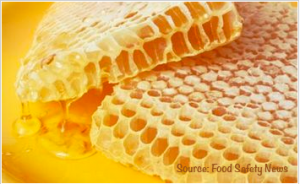Asian Honey may be risk to health.
Many health conscious individuals use honey as a substitute for white sugar and artificial sweeteners. And rightly so. Honey has a long history of benefitting mankind and is the perfect sweetener. Asian Honey accounts for as much as 30% of honey imports into the US and is mixed with domestic production. However, it’s not perfect if the Asian honey is either contaminated and or adulterated!
A third or more of all the honey consumed in the U.S. is likely to have been smuggled in from China and may be tainted with illegal antibiotics and heavy metals. A Food Safety News investigation has documented that millions of pounds of contaminated Asian honey banned as unsafe in dozens of countries are being imported and sold here in record quantities.
And the flow of Chinese honey continues despite assurances from the Food and Drug Administration and other federal officials that the hundreds of millions of pounds reaching store shelves were authentic and safe following the widespread arrests and convictions of major smugglers over the last two years.
Experts interviewed by Food Safety News say some of the largest and most long-established U.S. honey packers are knowingly buying mislabeled, transshipped or possibly altered honey so they can sell it cheaper than those companies who demand safety, quality and rigorously inspected honey.
“It’s no secret that the honey smuggling is being driven by money, the desire to save a couple of pennies a pound,” said Richard Adee, who is the Washington Legislative Chairman of the American Honey Producers Association.
“These big packers are still using imported honey of uncertain safety that they know is illegal because they know their chances of getting caught are slim,” Adee said.
Food safety investigators from the European Union barred all shipments of honey from India because of the presence of lead and illegal animal antibiotics. Further, they found an even larger amount of honey apparently had been concocted without the help of bees, made from artificial sweeteners and then extensively filtered to remove any proof of contaminants or adulteration or indications of precisely where the honey actually originated.
An examination of international and government shipping tallies, customs documents and interviews with some of North America’s top honey importers and brokers documented the rampant honey laundering and that a record amount of the Chinese honey was being purchased by major U.S. packers.
Food Safety News contacted Suebee Co-Op, the nation’s oldest and largest honey packer and seller, for a response to these allegations and to learn where it gets its honey. The co-op did not respond to repeated calls and emails for comment. Calls and emails to other major honey sellers also were unreturned.
Best strategy to avoid possibly contaminated Asian honey is to only buy and use locally sourced and produced organic honey. There are local and regional honey producers in almost every area of the country. Think twice about purchasing the generic and big box brands. Check out local farm stands and farmers markets or your local Community Supported Agriculture cooperative (CSA).
Source: Food Safety News
Read Full Article: Click Here!


Very is a very important and informative write-up.